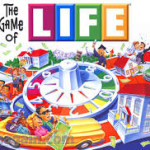How much – or how little – should you tell your children?
Hmm.
In my case, MS appeared overnight. Literally.
The Teenager was eleven and just about to start high school.
I was 37 and enjoying a peaceful weekend with friends as he was in London visiting his dad.
Halfway through, I was suddenly incapacitated, unable to walk properly or string a simple sentence together.
He was due back in two hours and I was in Accident & Emergency, facing an uncertain future and terrified for both of us. I checked myself out to be with him and arranged a scan for a couple of weeks time.
That MRI showed up numerous lesions and the subsequent positive lumbar puncture just added to the MS picture.
Sadly his entire high school years have been undertaken with a shadow of this illness.
However, I’ve tried my best to shield him – getting home from work at 2.30, falling asleep on the sofa and setting my alarm for 3.20 so I can be awake to greet him when he comes home from school, no matter how tired I was.
I slowly introduced him to symptoms – the walking funny (oops – could I call it a swagger?), the dropping stuff (gah), the bouncing off the walls (who put them there?).
Perhaps I’m prejudiced. I grew up with two ill fathers; my dad died of MS back in 1978 and my step-father died a lingering death from cancer. I really, really, don’t want to put my son through a childhood dominated by illness.
In fact, I would rather he saw the positivity that has come about from MS – my blog, my book, being invited to 10 Downing Street, joining the MS Society Cymru Council, or just being me.
MS deals you two cards. You can either take the downward spiral – it’s degenerative, the unemployment rate is shockingly high, your symptoms will no doubt deteriorate, it’s MS for God’s sake.
Or, you can say – ok, I’ll have a pity party for a year or so (yes, I did this – it wasn’t pleasant), then I’ll pick my sorry self up off the floor and get on with life. No longer will I lie awake at night rigid with terror about my future.
And here we are now – The Teenager, unbelievably, is sixteen.
We got through it. We are getting through it.
There’s been a lot of hard times along the way – I will never forget The Teenager crying in the bathroom or the time he was curled up in bed, worried about who would look after him if I had a relapse.
What should you tell the children?
Enough, but not too much.








Strong woman Ms Stumbling is! All things considered, and they have to be considered, I think you’ve done very well. And are doing very well. I’ve spent 25 years with ms, but not feeling it on a daily basis ’till two years ago when I hit the magic moment far enough away from menopause when our female hormones are at a basement level where it gently surfaced under the name of Secondary. The 23 years before that was just (just??) the occasional intense chemical allergic response episodes (CARE) to solvents which left each time (9-11 CARES over 23 years) after three weeks with no backward glances. My Brit. neuro didn’t acknowledge my CARES, but Finland did in 1939. I love Finland for that and hope to visit someday. Thank for reading. Be well. xxoo
Thank you!
So glad to hear MS behaved itself for you, for a good while at least.
I hadn’t heard of CARE before, so interesting to hear about this.
x
The acronym Chemical Allergic Response Episode is my creation. As for the long term secondary progressive MS effects, my US neuro cousin said it will progress as bad as the CARES got, (not as good as I returned to.) I hope not! Last summer I had bog standard stem cell treatment (good effects) and now almost two years into the secondary progressive ms it’s not bad.
Very glad to hear it 🙂
And long may it continue.
x
I was 34. My boys were 10 and 8. I went blind in the matter of hours. Optic Neuritis was the diagnosis then more tests and more symptoms started and WAMMM MS. I was open and honest with my boys right from the beginning. They are 26 and 24 now and are amazing dealing with me and my MS. I have been in the secondary progressive stage now for a few years. This doesn’t and has never phased them. Who ever ends up pushing my wheel chair ends up doing wheelies with me in it..gotta love boys
Love this!
It’s a fine line, isn’t it – you want to be open, just not too much to worry them.
I think in some ways MS has made The Teenager more compassionate, more caring with other people.
x
This is so true! My daughter is one and I am so scared of the impact my MS may have on her and how to manage it and how much or how little to share. I have never shared that I actually have MS with my nieces and nephews as don’t know how to say it! They just accept me as not so energetic and a little quirky! It’s a big decision! Love this post, thank you for sharing
It’s so difficult to know how open to be – I was always conscious that it was his childhood MS was impacting, not just my life.
I knew it would be wrong to keep him in the dark completely; kids deal better with some facts. Above all, I didn’t want to talk to The Teenager about my fears – that’s what my friends are for!
I’ve made mistakes along the way, but all in all, we’ve scraped through!
X
I was positive at the very beginning mainly so people wouldn’t worry. That positivity became infectious when they started to ask me about MS rather than tread on egg shells around me.
Well done for balancing that with being a mother. This world could do with more like you (too much?)
Aw, thank you!
I like your comment about positivity being infectious – I think that’s so true. We can do a lot to change the perception of MS being a Game-Over diagnosis!
x
Positive outlook is a must. We learn to adapt to the path we are on and live our lives. We are allowed personal pity parties now and then but not every moment of every day. Keep posting. Your story helps us all.
Thank you!
You’re right – we’re all allowed a pity part every so often 🙂
Life is about rolling with the bad times and enjoying the good!
x